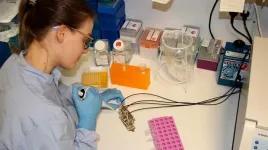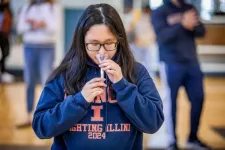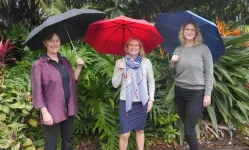(Press-News.org) Bioplastics -- biodegradable plastics made from biological substances rather than petroleum -- can be created in a more economical and environmentally friendly way from the byproducts of corn stubble, grasses and mesquite agricultural production, according to a new study by a Texas A&M AgriLife Research scientist.
green tractor pulling a red cart through a field of bioenergy sorghum that is taller than the tractor
A bioenergy sorghum crop is harvested near College Station. (Texas A&M AgriLife photo)
This new approach involves a "plug-in" preconditioning process, a simple adjustment for biofuel refineries, said Joshua Yuan, Ph.D., AgriLife Research scientist, professor and chair of Synthetic Biology and Renewable Products in the Texas A&M College of Agriculture and Life Sciences Department of Plant Pathology. These "plug-in" technologies allow for optimization of sustainable, cost-effective lignin -- the key component of bioplastics used in food packaging and other everyday items.
The $2.4 million project is funded by the U.S. Department of Energy's Energy Efficiency and Renewable Energy Bioenergy Technologies Office. The research has recently been published in Nature Communications.
Yuan and researchers are submitting next-phase requests for additional project funding.
An adaptable process
head shot of a man in glasses - Joshua Yuan.
Joshua Yuan, Ph.D. (Texas A&M AgriLife photo)
Efficient extraction and use of lignin is a major challenge for biofuel refineries, Yuan said.
"Our process takes five conventional pretreatment technologies and modifies them to produce biofuel and plastics together at a lower cost."
Yuan's research builds on previous work investigating enhanced extraction methods for lignin.
The new method, named "plug-in preconditioning processes of lignin," or PIPOL, can be directly added into current biorefineries and is not cost prohibitive, Yuan said. PIPOL is designed to integrate dissolving, conditioning and fermenting lignin, turning it into energy and making it easily adaptable to biorefinery designs.
Bioeconomy 'a federal priority'
Yuan said the bioeconomy and biomanufacturing sectors are a federal priority as the White House Office of Science and Technology Policy points to bioeconomy infrastructure, innovation, products, technology and data to enhance U.S. economic growth.
a picture of a sorghum head after seeds were removed as well as a stock and a small glass container with seed in it
A high-yielding perennial sorghum forage hybrid can be used as a feedstock to create bioplastics in a more economical and environmentally friendly way. (Texas A&M AgriLife photo by Kay Ledbetter)
The bioeconomy supports some 285,000 jobs and generates $48 billion in annual revenue.
"Innovation is the key to achieving growth and a more widespread use of biodegradable plastics. Lignocellulosic biorefinery commercialization is hindered by limited value-added products from biomass, lack of lignin utilization for fungible products and overall low-value output with ethanol as primary products," he said. "This recent discovery will make significant strides to overcome some of these challenges."
Yuan also touted the research for its environmentally friendly aspects.
"We are producing over 300 million tons of plastics each year," he said. "It's critical to replace those with biodegradable plastics. This work provides a path to produce bioplastics from common agriculture waste like [that from production of] corn and other grasses and wood.
"We think this research is very industrially relevant and could only help enable the biorefinery and polymer industries to [attain] greater efficiencies and economic opportunity."
The role of agriculture byproducts
AgriLife Research and the College of Agriculture and Life Sciences share a commitment to seek solutions through science to solve environmental challenges. Their research has already found that sustainable products such as mesquite and high-tonnage sorghum can be used as feedstock for biofuel production.
Agricultural byproducts such as corn stubble and other grasses are alternative feedstock sources for biofuel plants, Yuan said. These create potential new revenue streams for farmers as well as the transportation sector that transports harvested feedstock and byproduct crops to refinery operations.
"We have shown that bioplastics from lignocellulosic biorefineries can be more economically beneficial, which opens new avenues to use agricultural waste to produce biodegradable plastics," Yuan said. "The discovery will mitigate global climate changes via replacing fossil fuel and nondegradable plastics by renewable and biodegradable plastics."
INFORMATION:
Dinosaurs roamed the Earth more than 65 million years ago, and paleontologists and amateur fossil hunters are still unearthing traces of them today. The minerals in fossilized eggs and shell fragments provide snapshots into these creatures' early lives, as well as their fossilization processes. Now, researchers reporting in ACS Earth and Space Chemistry have analyzed the molecular makeup of fossilized dinosaur eggshells from Mexico, finding nine amino acids and evidence of ancient protein structures.
Current research indicates that all dinosaurs laid eggs, though most haven't survived the test of time. And because whole eggs and shell fragments are very rare fossils, their mineral composition ...
Newly published research shows that a screening program in the University of Cincinnati Medical Center Emergency Department helped detect an outbreak of HIV among persons who inject drugs in Hamilton County, Ohio, from 2014-18.
The study was published in PLOS ONE.
The results of the study highlight UC contributions to public health surveillance as yet another reason why emergency departments should be screening for undiagnosed HIV infections, according to Michael Lyons, MD, associate professor in the Department of Emergency Medicine at the UC College of ...
Some people casually smoke cigarettes for a while and then stop without a problem, while others develop long-term, several packs-per-day habits. A complex mix of environmental, behavioral and genetic factors appear to raise this risk for nicotine dependence.
Studies of groups of twins suggest that 40 to 70 percent of the risk factors are heritable. Until recently, however, studies have only explained about 1 percent of the observed variation in liability to nicotine dependence, using a genetic score based on how many cigarettes a person smokes per day.
A new study led by psychologists ...
Using an experimental model to simulate the blood-brain barrier, scientists in Sweden reported in unprecedented detail how antioxidants protect the brain from inflammation caused by neurodegenerative diseases such as Alzheimer's and Parkinson's.
The study, conducted as a proof of concept by brain model developers at KTH Royal Institute of Technology in Stockholm, showed in minute-by-minute detail how the blood-brain barrier reacts to high levels of inflammation after the administration of a next-generation derivative of the widely-used anti-inflammatory drug, NAC (N-acetylcysteine).
The testing of NACA (N-Acetylcysteine Amide) for the first time with ...
A new way to target a mutant protein which can cause the deadliest of cancers in humans has been uncovered by scientists at the University of Leeds.
The mutated form of the RAS protein has been referred to as the "Death Star" because of its ability to resist treatments and is found in 96% of pancreatic cancers and 54% of colorectal cancers.
RAS is a protein important for health but in its mutated form it can be switched on for longer, leading to the growth of tumours.
One drug has already been approved for treatment but it can only tackle a small subset of ...
In a study involving 34 women aged 50-70, researchers at the University of São Paulo (USP) in Brazil performed objective measurements of the impact on the subjects' health of the decrease in physical activity observed during the period of social distancing and isolation imposed by COVID-19. Tests conducted after the first 16 weeks of confinement pointed to a deterioration in their overall health, including loss of muscle strength and diminished aerobic capacity, as well as elevated levels of cholesterol and glycated hemoglobin, both of which are risk factors for metabolic disorders.
The study was supported by São Paulo Research Foundation ...
When it comes to understanding and predicting trends in energy use, the internet is a tough nut to crack. So say energy researchers Eric Masanet, of UC Santa Barbara, and Jonathan Koomey, of Koomey Analytics. The two just published a peer-reviewed commentary in the journal Joule discussing the pitfalls that plague estimates of the internet's energy and carbon impacts.
The paper describes how these errors can lead well-intentioned studies to predict massive energy growth in the information technology (IT) sector, which often doesn't materialize. "We're not saying the energy use of the internet isn't a ...
CHAMPAIGN, Ill. -- The chance of detecting the virus that causes COVID-19 increases with more frequent testing, no matter the type of test, a new study found. Both polymerase chain reaction and antigen tests, paired with rapid results reporting, can achieve 98% sensitivity if deployed at least every three days.
"This study shows that frequent testing can be really effective at catching COVID-19 infections and potentially blocking transmission," said study leader Christopher Brooke, a virologist and professor of microbiology at the University of Illinois Urbana-Champaign. "There are many places where vaccination is not yet widespread. With the rise of variants, testing remains an important tool ...
QUT researchers have developed a new machine learning mathematical system that helps to identify and detect changes in biodiversity, including land clearing, when satellite imagery is obstructed by clouds.
Using statistical methods to quantify uncertainty, the research, published in Remote Sensing in Ecology and Conservation, analysed available satellite images of an 180km square area in central south-east Queensland.
The region is home to many native species including the critically endangered northern hairy-nosed wombat and the vulnerable greater glider, and the ...
Fossilized feces are common finds at paleontological dig sites and might actually contain hidden treasures. By scanning fossilized dung assigned to a close dinosaur relative from the Triassic period, scientists discovered a 230-million-year-old beetle species, representing a new family of beetles, previously unknown to science. The beetles were preserved in a 3D state with their legs and antennae fully intact. The finding appears June 30 in the journal Current Biology.
The discovery that fossilized droppings, also known as coprolites, can preserve ancient insect species offers a new alternative to amber fossils--fossilized tree resin, which normally yield the best-preserved insect fossils. The oldest ...




